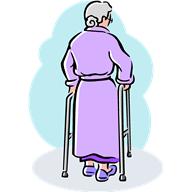Just last night, I picked up a
call from my cousin in the States. Eileen is twenty years my senior at 84 years
young.
"We're all doin' fine," she says in her warm, broad
accent. Eileen is a strong-willed, determined lady, as you have to be when
you're of an age when things don't work as well as they used to. She's
doing fine but her legs don't work so well and her doctor's advised her not to
drive any more because her reflexes aren't what they should be. But she's doing
fine.
They went on a long road trip over the holidays to visit family
and old friends they haven't seen in more than ten years. A round trip
of nearly two-thousand miles across three States. They loaded up and
unloaded six times stopping off in motels on the way. Not bad for 84 years young.
They got back ten days ago. Thursday, Eileen got an unexpected
and most unwanted surprise. She went for a check-up with her doctor. He's
been her doctor for some thirteen years and more. He's a good doctor, she says,
and he's looked after her well, but he's not doing an office anymore. He's
going to work in a hospital and he won't be doing an office there.
Eileen is shattered. She doesn't want to lose him. She's been
looking round for another doctor. One doctor told her she would get back
to her. They left and went to the Commissary. That was Friday
afternoon. She had her cell phone with her but turned it off on the
base. She checked in after but there was no message left. She's going to check
back with this doctor on Monday.
Where is this leading? Eileen is on Medicare. She's worried because
of this new health thing that's coming in. They've taken a chunk of money out
of Medicare to fund it. It's going to affect older folks, she says. She's
worried she won't get the treatment she used to get. She still knits and does
stuff for the church, she says. She's not ready to 'check out' just yet, she
says. But right now, she just wants a new doctor.
She's worried, she says. A lot of folks are worried, her old
friends down there in Florida
This is US
"...not only is this health care spending on the elderly the key issue in the federal budget, our disproportionate allocation of health care dollars to old people surely accounts for the remarkable lack of apparent cost effectiveness of the American health care system. When the patient is already over 80, the simple fact of the matter is that no amount of treatment is going to work miracles in terms of life expectancy or quality of life."
Shucks, Eileen's 84 years young, not 84 years old, and
she "Ain't ready to check out just yet," thankyou kindly!
"Read Frakt for a bit of an account of how this arises operationally, but what I think is more important is that it arises on a meta-level because we have such a fragmented health care system. When your health care spending is all in one bucket, then at any given level of spending you face a question about how to allocate it. And when allocating spending between young and old, you're cross-pressured. On the one hand, older people have more need for health care services which militates in favor of allocating spending to them. On the other hand, providing health care services to younger people generally offers better value in terms of years of life and quality of life saved. A 25 year-old who's in a bad car accident can, if found in time and treated, still live a very happy and healthy life. If you're 95 and get into the same car accident, then treatment is going to be much more difficult, recovery will be much less complete, and in the grand scheme of things you're not going to live very long anyway."
Looks like 84 years young isn't going to qualify for
the same sort of treatment as 48 years old.
Simon Stevens was Tony Blair's advisor on NHS reform. He now
heads up United Health.

UnitedHealth buys two Medicare plans
UnitedHealth on Tuesday announced that it's buying two Florida insurance companies that manage Medicare and Medicaid plans, further positioning itself as a leader in the Medicare market.
The acquisition of Preferred Care Partners and Medica, both located in the Miami area, would add almost 100,000 members--including 85,000 Medicare Advantage members and 12,000 Medicaid members--as well as eight clinics for UnitedHealth, thereby beefing up the insurer's already strong position in Florida, where about 10 percent of all Medicare beneficiaries live, reported Reuters.
UnitedHealth is the largest insurer in terms of enrollment, including seniors. It claims to provide insurance for one in five Medicare beneficiaries.
"This is certainly a bold move by United," Joseph Caruncho, founder and chief executive officer of Preferred Care, said. "It shows their commitment to become involved in South Florida and immediately become a major player."
Caruncho added that UnitedHealth will benefit from its existing "relationship with the community and the seniors," reported the Miami Herald.
Preferred Care and Medica will remain separate from UnitedHealth's HMO, and their members won't see any changes in coverage this year. However, UnitedHealth hasn't announced its integration plans beyond 2012, according to the South Florida Business Journal.
Terms of the two deals were not announced.
This is MPR News -
Changes to govt. health care could save on costs, United Health Group reports
by Elizabeth Stawicki, Minnesota Public Radio
January 9, 2013
ST. PAUL, Minn. — A report by UnitedHealth Group said the U.S. could reduce spending on Medicare and Medicaid by doing a better job of coordinating patient care, particularly for those with chronic illnesses such as diabetes.
The report's author, Simon Stevens, said the U.S. could save more than half a trillion dollars over a decade by changing how it cares for patients on those government health plans, which provide coverage for the elderly, disabled, and low income.
ensure that quality health care is accessible to all Americans,
and that it is affordable and sustainable - not a burden to future generations.
"Affordable,
sustainable..." That sounds remarkably like what's being said here about
the NHS. One of United Health's 'six priority areas' is -
Modernizing Medicare. Improving chronic disease management and end-of-life care.
What does that mean exactly...?
Helping people onto palliative rather than curative care options? Recognising
death and dying as positive life options in place of 'futile' interventions?
And we remain committed to fostering a constructive discussion. To that end, we formed the United Health Center for Health Reform & Modernization. Drawing on our internal expertise and extensive external partnerships, the Center assesses and develops innovative policies and practical solutions for the biggest health care challenges facing our nation and seeks to share information with policymakers and the public.
"Starting in the mid-fifties, American per capita health care spending goes from marginally higher than Germany or Sweden to a lot higher. Then as Americans reach their late sixties, a large share of that spending is shifted onto the public books as Medicare and the spending gap keeps on rising."
I hope Eileen finds a doctor
who will take her on. We write, and she rings us up when she can, which is
three or four times a year. She'll tell me next time we speak.
When it comes to end of life decisions, the state does not love you
Many years ago, when Holland first enacted its euthanasia law, NPR ran an interview with a Dutchman who explained why euthanasia was a good idea in Holland, while it would be a terrible idea in America. The secret to Holland’s euthanasia, he said, was socialized medicine. The man explained that, in America, where medical costs could bankrupt families, those with terminal illnesses could be actively or passively coerced into turning to euthanasia in order to save their family’s finances.
Put another way, this man and the NPR host who interviewed him were both certain that Americans, when given the choice, would cheerfully throw Grandma from the train in order to save some money. Europeans, the Dutchman explained, with their cradle to grave care, would never be pressured into killing themselves. The beneficent state would pay all the medical bills, so money would not be an issue when it came to life and death decisions. The only thing that would matter in Europe, said this Dutchman, was the terminally ill person’s wishes.
I, being a good liberal back in the day, enthusiastically endorsed what he had to say. Clearly, euthanasia was a dreadful idea in America, where money was God, and people would be tempted to slip arsenic into their dying child’s broth in order to save the college fund for the next kid in line.
History has revealed that this Dutchman was absolutely and completely wrong. In America, people have willingly bankrupted themselves to save beloved family members. Mammon becomes meaningless when an extra treatment might give your child or a young mother a few more days, weeks, or years of life. People have hearts and souls. They connect to others, especially to those in their families.
It’s very different in socialist states, where euthanasia is the name of the game, often without the patient’s, or her family’s, agreement. In England, thousands of terminally ill people were hastened to their deaths by the Liverpool Care Pathway. It was meant to be a national hospice program that provided palliative care to the terminally ill in their final days. What ended up happening, of course, when the National Health Service started running out of money is that thousands (even tens of thousands) of elderly patients who were terminally ill, but weren’t anywhere near death’s door, were hastened to their deaths. They had become too expensive or just too difficult to manage.
It turns out that, twenty-odd years ago, when I heard that Dutchman speak, he had failed to consider two pertinent facts: First, socialist states invariably run out of money once they finally destroy their productive class; and second, the state has neither heart nor soul. To you, Patient X is your beloved mother, or brother, or child. To the state, Patient X is an unnecessary cost to an already strained system.
What frightens me is that, in Obama’s America, even before socialized medicine takes over, we might be losing the heart and soul that distinguishes individuals from the state. The Anchoress found at Salon an article in which Mary Elizabeth Williams, who supports abortion, finally comes out and said it: So what if abortion ends life? It’s almost refreshing to see this kind of honesty about one side of a divisive issue:
Here’s the complicated reality in which we live: All life is not equal. That’s a difficult thing for liberals like me to talk about, lest we wind up looking like death-panel-loving, kill-your-grandma-and-your-precious-baby storm troopers. Yet a fetus can be a human life without having the same rights as the woman in whose body it resides. She’s the boss. Her life and what is right for her circumstances and her health should automatically trump the rights of the non-autonomous entity inside of her. Always.[snip]And I would put the life of a mother over the life of a fetus every single time — even if I still need to acknowledge my conviction that the fetus is indeed a life. A life worth sacrificing.
The Anchoress slices and dices the whole argument, but I found this point particularly compelling:
A point of order, please: One may certainly sacrifice one’s own life for another. That is what makes it a sacrifice. Sacrificing “another’s” life is not a sacrifice, unless that other person actually (like Jesus Christ or a soldier who has volunteered to serve, or a mother like this one) says, “yes, I will be sacrificed for the sake of others.”Absent that permission, though, it’s not a sacrifice. It’s just an expedient, and wasteful killing.In fact, the notion that someone else’s life is “worth sacrificing” for the furtherance of one’s own situation — the mindset that can advance that thinking — is precisely one that deserves the name “diabolical.”
Although both the Salon article and the Anchoress’ rebuttal focus on the beginning of life, the whole article is unnerving about life’s end too. The writer’s approach to human beings — we must sacrifice innocent lives for the greater good — has the same stark utilitarian logic found in the heartless and soulless socialist state that readily puts humans on a death pathway because they’re too expensive to care for.
Twenty years ago, I wrongly thought that a state’s magisterial power and wealth would be more pro-life than the human ties that bind people together. I’m now scared that, twenty years hence, both states and humans will cheerfully dispatch any expenses or inconveniences. And yes, it can happen here. It happened in Germany, it happened in the Soviet Union, it happened in Turkey, it happened in Cambodia, it happened in Rwanda….
Whether one believes that the Bible is God’s handiwork or man’s, it is a book of inestimable wisdom about humankind’s strengths and foibles. The constant exhortations to life stand as a reminder that man wears his civilization very lightly and that, beneath it, there is animal savagery, without any sense of morals, ethic, justice, or love. It would be interesting to see what that long ago Dutchman, or the representations of the National Health Service, or even Mary Elizabeth Williams would say about the Biblical injunction to “choose life.“




No comments:
Post a Comment